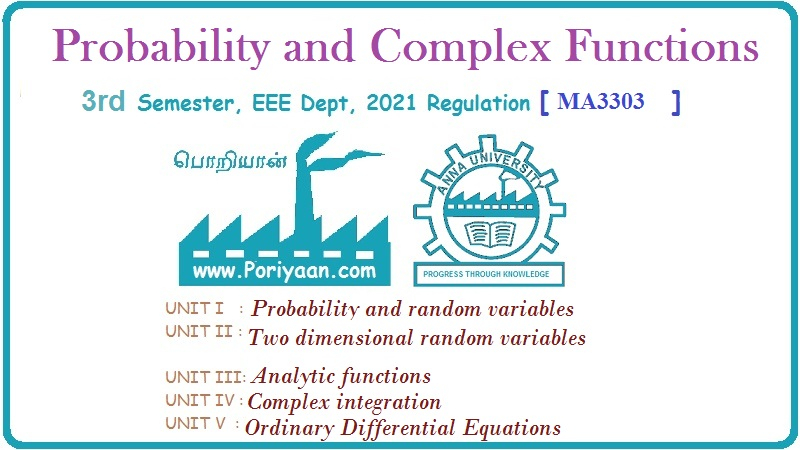Probability and complex function: Unit IV: Complex integration
Cauchy's residue theorem
Statement, Proof, Formula, Solved Example Problems
Probability and complex function: Unit IV: Complex integration : Cauchy's residue theorem
Cauchy's residue theorem
State
and prove Cauchy's theorem on residues. [Anna, Oct 1997]
[A.U
M/J 2014, Statement only] [A.U D15/J16 R-08]
Statement:
If f (z) be analytic at all points inside and on a simple closed curve C,
except for a finite number of isolated singularities

Proof
:
We enclose the singularities z1, z2, ..., Zn by small
non-intersecting circles C1, C2, Cn with centres at z1,
z2, ..., Zn and radii P1, P2, ... ....
Pn lying at the whole inside C.
Then,
f (z) is analytic in the multiply connected region enclosed by the curves C, C1,
C2, ..., C., Hence, by Cauchy's extension of integral theorem
we
see

PROBLEMS BASED ON CAUCHY'S RESIDUE THEOREM
Example 4.3.31. Evaluate using Cauchy's residue theorem,

[A.U. N/D 2011, M/J 2013]
Solution:

Singular points of the function f (z) are got by equating the denominator to zero, we get
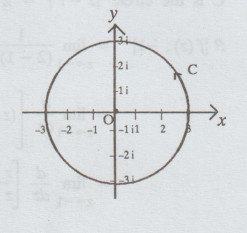
(z − 1) (z - 2) = 0
z = 1 lies inside | z | = 3
z = 2 lies inside | z | = 3

Example 4.3.32. Evaluate  where C is the circle | z - i| = 2 using Cauchy's residue theorem.
where C is the circle | z - i| = 2 using Cauchy's residue theorem.
[A.U. M/J 2012]
Solution:
Let f(z) = z – 1 / (z + 1)2 (z - 2)
Singular points of the function f (z) are got by equating the denominator to zero, we get
(z + 1)2 (z − 2) = 0
z = -1 is a pole of order 2 lies inside C
z = 2 is a simple pole lies outside C.
C is the circle | z - i | = 2 with centre (0, 1) and radius r = 2.

Example 4.3.33. If C is the circle |z|= 3, then evaluate

Solution:

Example 4.3.34. Using Cauchy's residue theorem evaluate

Solution:

Singular points of the function f (z) are got by equating the denominator to zero, we get (z1) (z - 2) 0.
z = 1 is a simple pole and lies inside C
z = 2 is a simple pole lies outside C
C is the circle |z - i| = 2 with
centre (0, 1) and radius r 2.
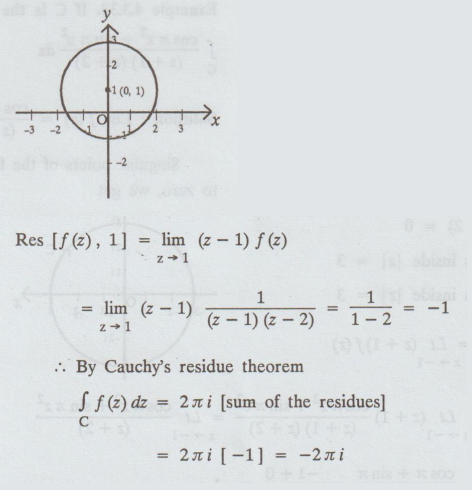
Example 4.3.35. Evaluate  where C is |z| = 1 using Cauchy's residue theorem.
where C is |z| = 1 using Cauchy's residue theorem.
Solution: Let f (z) = 1/ z sin z
The singularity of f (z) is given by
z sin z = 0
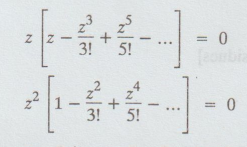
z = 0 is a pole of order 2
z = 0 lies inside C

Example 4.3.36. Evaluate  dz, where C is any circle with centre origin.
dz, where C is any circle with centre origin.
Solution:
Let f (z) = sin (1/z)
The only singular point is z = 0 which is inside C.
Sin (1/z) = 1/z – 1/3!z3 + …
Res,[f(z) 0] = co-efficient of 1/z = 1
By Cauchy's residue theorem, we get
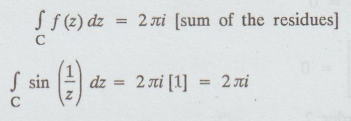
Example 4.3.37. If C is the boundary of the square, whose sides along the lines x = ±2 and y = ±2 and described in the positive sence, find the value

Solution:

Example 4.3.38. Evaluate  where -2 < a < 2 and C is the boundary of the square whose sides lie along x = ± 2 and y = ±2
where -2 < a < 2 and C is the boundary of the square whose sides lie along x = ± 2 and y = ±2
Solution:

Example 5.3.39 Evaluate  where C is the circle |z - i| = 1, using Cauchy's residue theorem. [A.U N/D 2016 R-13]
where C is the circle |z - i| = 1, using Cauchy's residue theorem. [A.U N/D 2016 R-13]
Solution:
Let f (z) = z / (z2 + 1) 2 = z / [(z + i) (z - i)]2
z = i is a pole of order 2, lies inside |z - i|= 1
z=-i is a pole of order 2, lies outside | z - i | = 1
Given: |z - i| = 1
Here, Centre i, i.e., (0, 1) and radius 1

Probability and complex function: Unit IV: Complex integration : Tag: : Statement, Proof, Formula, Solved Example Problems - Cauchy's residue theorem
Related Topics
Related Subjects
Probability and complex function
MA3303 3rd Semester EEE Dept | 2021 Regulation | 3rd Semester EEE Dept 2021 Regulation
